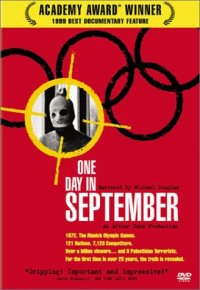|

 Jurassic
Mark Jurassic
Mark
SCORE: 3
 Stars Stars

One Day in September tells a biased (or perhaps incomplete)
story. The events that led up to the Palestinian terrorist actions at
the 1972 Munich Olympics are largely left unexplained. If any of this
is unfamiliar to you (much of it was to me) I'll briefly describe the
situation. In 1972, eight Palestinian terrorists entered the
Olympic village and took all eleven members of the Israeli team
hostage. One of the Jews escaped and two more were killed resisting
the Palestinians. The terrorists demanded the release of 200
political prisoners, or they would start killing the Israelis.
Director Kevin Macdonald makes an interesting (and I believe
philosophically Western) decision on when to begin the story. Even
more than fiction, the non-fiction storyteller must be careful he
doesn't leave out crucial background information. I was irritated
that I was uninformed on the reasons for the Palestinian's attack on
the Israelis. Sure, we all know the history between these countries,
but there must have been something specific that ignited the suicide
mission. Instead, director Macdonald chooses to focus on the victims
and leave politics out of the picture. At one point, narrator Michael
Douglas makes the statement that the terrorists entered the village
with the aid of members of the East German team. No further mention
is made of this accusation, and no mention of indictments of
individuals from the East German team are revealed.
So, historians and fact-mongers will surely be disappointed by One Day
in September. Personally, the film works for me because everything
I've ever been taught abhors the notion of terrorism. I'm not the
first to call it cowardly. Terrorists aren't heroes; they are
jingoistic puppets suffering from "little man" syndrome.
The documentary clearly shows the nation of Israel's position
regarding terrorism: zero tolerance, no deals. Every time a
Palestinian stuck his head out of the Olympic compound, I
half expected a sniper to gun him down. If your policy is zero
tolerance, the logical procedure is to take a specially trained
unit into the Olympic village and annihilate the enemy regardless of
civilian casualties.
Then we see the tragic results of a nation that is unwilling to back
up its zero tolerance policy. All the Israeli athletes are killed
anyway. Amazingly, three of the eight Palestinians escape through
what can only be described as a major blunder by the German
government. It's really hard to believe the German government was
that stupid. The German's actions throughout the tragedy force the
viewer to question either their integrity or their competence.
I have to admit I admired the Israeli special forces for hunting down
and killing two of the three terrorists. Too bad they weren't so
decisive earlier. One of the Palestinians is still alive, and,
amazingly, is interviewed extensively throughout the film. He
maintains that his is proud of what he did in 1972. I'm not
surprised. The dead terrorists received a heroes welcome where tens
of thousands of Palestinians lined the streets cheering and fighting
for a chance to touch the coffins.
One Day in September won the Oscar for Best Documentary in 2000. I
doubt it deserves it, but since documentaries rarely show outside of
New York and L.A., I'm really not in a position to argue.
 Randolph
Carter
Randolph
Carter
SCORE: B+
 Cringe-o-meter: (out
of 10) 2--for several photos of the dead athletes bodies.
Recommended for: Anyone who is not familiar with the tragic story of
the 72 Olympics in Munich and for those who enjoy a well-crafted,
brisk paced documentary.
Strengths: Exceptional soundtrack (Philip Glass and Led Zeppelin, to
name a couple) ; The pacing of the film.
Weaknesses: As Jurassic Mark mentioned, there was a shortage of
background material on several key issues of the story leaving too
many unanswered questions.
Comments: I for one don't see a lot of documentaries, and most of
the ones I've seen make me feel as though I'm watching a rather
subdued television news program. This, thankfully was not the case
with "One Day in September." By juxtaposing commentary by one of the
Israeli victim's wives with that of the last surviving terrorist, we
get to see, in stark reality, both sides of this little understood
issue. "One day in September" is not an easy film to watch, but it is
powerful, and it does present a somewhat even treatment of the
opposing sides in the issue of terrorism. For me it was hard not to
take sides in this film. As a Westerner, the whole idea of terrorism
is enigmatic. The filmmakers of course realize this and exploit it to
full effect. What I found to be most ironic is that the two most
powerful scenes in this documentary are the ones that remain so
foreign to me: when we witness the five coffins of the Palestinians
retuned to their homeland and getting lifted through a frenzied crowd
as countless people try to touch the coffins of their newly "martyred"
countrymen. The other comes in the concluding moments of the film,
when the last surviving terrorist mentions (even though he has been in
hiding for close to 30 years) that he
is still proud of what he helped accomplished back in 72.
|